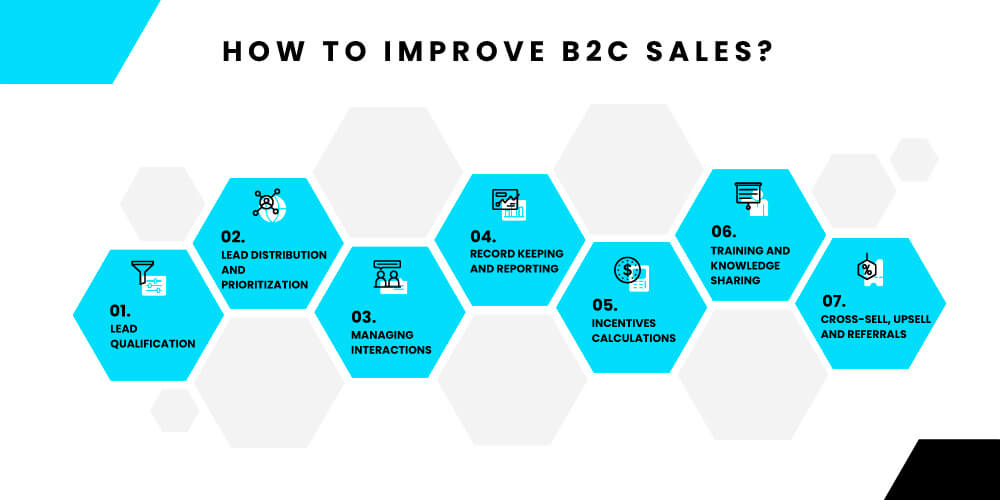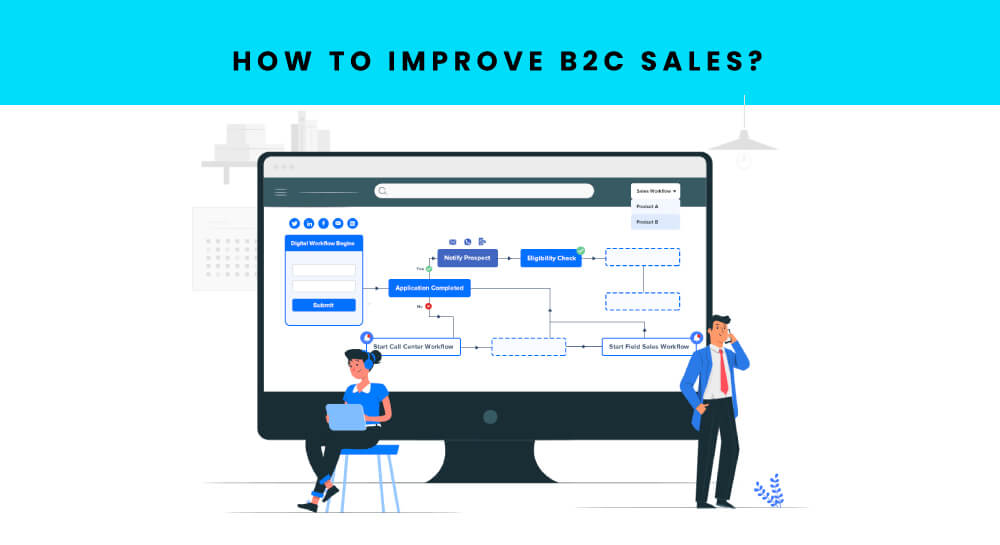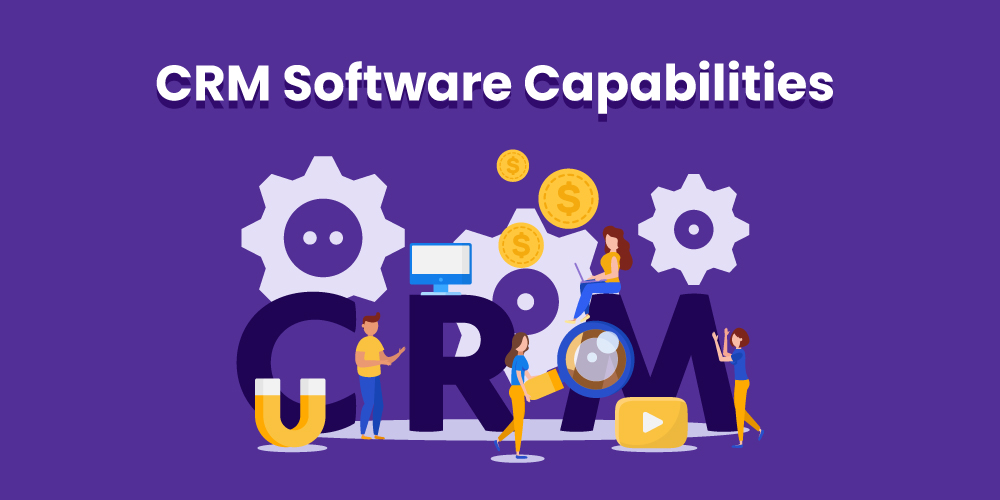Today, e-commerce has shifted retail sales to online to a great extent. There is hardly an involvement of sales reps. However, despite having an online presence, sectors like EdTech, insurance, lending, healthcare, SaaS products, travel, and online marketplaces need a sales team for interacting with customers and closing sales.
In this article, we will address the challenges and strategies to improve B2C sales.
B2C sales challenges
Finding leads is generally not an issue for B2C organizations. With digital marketing, events, agency outsourcing, and other sources, businesses generate a significant volume of leads. However, nurturing leads and pulling them down the sales funnel is the main challenge for the sales teams. Another pressing challenge that B2C sales face is of lead leakage. Since there are so many and diverse sources of leads (online, offline, intermediaries), it is essential to plug the leaks.
Let us take an example. Due to the Covid-19 pandemic, regular classroom coaching took a hit, and students and parents resorted to online education. Therefore, the EdTech sector gained a sudden boost.
EdTech companies were able to reach out to millions of students through marketing. But handling queries like course modules, fee structure, etc. became a humongous task. Moreover, selling courses required hard selling skills and proper sales strategies.
Similar is the case with other industries like insurance, lending, healthcare, delivery, cleaning services, to name some.
The most pressing challenges that salespeople state include:
- Quality of leads: Sales teams spend a lot of time convincing the uninterested prospects or casual inquiries. It impacts their speed-to-lead to qualified leads.
- Prioritization: Generally, salespeople handle prospects based on a first-come-first-serve basis. It is not the optimum method as they waste time nurturing junk leads or the leads who will never buy.
- Calling: Finding lead information and then calling them from their cellphone is time-consuming.
- Status update: After calling leads, sales reps need to maintain a log and meeting/interaction notes in an excel sheet.
- Follow-ups: Salespeople create their own reminders/alarms to follow-up with a customer. Sometimes, they also refer to the excel document to check if a follow-up is pending.
- Incentives: Many sales reps are dissatisfied with the bonus or incentives they receive. On the other hand, managers find it tough to calculate incentives for individual sales reps/agents.
B2C sales challenges for managers
Apart from the above B2C sales challenges, sales managers find it difficult to manage sales at the team level. Many industries rely heavily on external agents and call-centers. Also, many businesses outsource the field teams to third-party hiring agencies. Managing contractual workers (especially in some sectors where the churn rate is high) presents some serious challenges to regional/city sales managers.
All these factors impact the productivity of the sales teams, increases the sales cycle, and reduces conversions. At times, old-school sales methods leave a terrible customer experience in a fast-moving digital world.
Fortunately, companies can improve their B2C sales process with the help of technology. Let us see how.

How do you improve B2C sales?
It is crucial to align both – marketing and sales strategies to improve B2C sales. Generating leads through marketing will not bring any result to a business if the sales process is not optimized for conversion.
Therefore, in today’s time, aligning your sales and marketing teams is crucial.
However, this is not enough.
To drive better results, you need to invest in technologies that can improve your sales teams’ productivity. Let us look at ways to improve your sales reps’ productivity and reduce speed-to-lead and conversion time.
Lead qualification
As salespeople say – they waste a lot of time and effort in communication with casual inquiries and lose prospects who have better chances of conversion. You can filter the leads to resolve this issue.
By tracking the lead source, the amount of time they are spending on your website, and whether they have navigated the pricing page, location, etc. you can assign scores to the leads. It will help you understand the leads’ intent and interest in your product/services.
Naturally, a prospect who is interested in your offering will browse more about you. All these attributes will help you identify and filter qualified leads.
Lead distribution and prioritization
Another problem that salespeople raised was about prioritization of leads. Instead of interacting with inquiries in sequential order, you can assign leads to sales reps based on lead scores. That is, sales reps can contact the qualified leads before others.
Also, if you also have a call center team, then you can distribute leads among call center agents and your in-house sales team.
Related reads:
Simplifying interactions to improve B2C sales productivity
Salespeople mentioned that calling from their mobile phones consumes time. Sales CRM (Customer Relationship Management) software integrates with cloud calling systems (e.g., RingCentral), telephony, and dialer systems to enable calls from laptops/computers.
A sales representative needs to call many prospects every day. By saving even 5 minutes per call, you can improve productivity to a great extent. The sales rep can thus accomplish more calls per day.
Similarly, sales CRM makes follow-up easy for sales reps. If the contact was not available, then the system can register that and remind/notify the salesperson to call the customer again after a defined interval of time. It is also possible to automate such workflows with CRM systems.
Listen to the webinar – how to accelerate revenues with sales automation?
Record keeping and reporting
The root cause of missed information is the lack of a platform for end-to-end sales activities.
For example, you have captured leads through digital marketing. A typical scenario is – the marketing teams will share the lead information in an excel sheet every day. Now, sales reps will maintain their documents for meeting notes, prospect status, lead stage, and more.
It might be workable on a small scale. But it creates a lot of inefficiencies when you scale and expand. Producing monthly reports and quarterly reports become a task for managers. Sales executives can save time spent on making reports in closing more deals.
The point is – to improve your B2C sales, you need a system that can maintain interaction history and generate reports automatically.
Incentives calculations
If you have a system in place that tracks your sales teams’ performance and conversions, you can automate incentive calculations as well.
We all know that incentives play an important role in motivating the team. The system defined incentive modules are more accurate and fact-based.
[Also read: Sales SPIFF Examples and Ideas to Motivate Your Teams]
Training and knowledge sharing
Sales teams need to know the product/services well. They also need to know the competitors’ offerings. For instance, a customer may ask that why should he buy your product/services over your competitors? If the sales reps are not well versed in the market, they may fail to convince the customer.
Proper training and knowledge about the product are crucial. However, product features and offerings may change from time to time. For example, there can be discount offers in a particular region. Therefore, you need a system that can notify each user about the product update and ensure they adhere to the changes.
[Also read: Sales onboarding template and checklist]
Cross-sell, upsell, and referrals
It is easy to sell to existing customers and in their network. Whether you have a separate referral department or not, you can find new opportunities with your existing clients.
Although we are successful marketing through our website, social media, email and seminars, the biggest key to our finding new business and consumer clients is through the referrals we receive, whether B2C or B2B,” says Samir Thakkar, Founder and Managing Partner of 20/20 Financial Advisers (Source: Forbes).
Final thoughts
Even though direct sales through self-serve portals are on the rise, the need for sales interaction is still intact. Retail might have seen the shift of the sales role to support role to some extent, but many other industries rely heavily on sales through agents and personal interaction with customers.
The key to success in B2C sales involves effective marketing, sync between sales and marketing, and sales process automation to improve the productivity of sales representatives. By streamlining your internal sales process, you can achieve better sales targets with the same resources. All you need is a CRM software that addresses all these concerns and has a friendly UI.
Fortunately, today sales and marketing teams can have access to real-time operational metrics and buyer intents with the help of CRM solutions.
LeadSquared Sales Execution CRM has improved the average sales per day per agent by 40% and the lead-to-sale ratio by 35% for businesses. You can also try it for your business.
B2C Sales FAQs
What is the difference between B2C and B2B sales?
B2C sales differ from B2B sales in many ways. First, the lead and sales volumes are high, and at the same time, lead quality is also lower. Therefore, salespeople need to identify interested customers. Two, you can sell directly from your website, affiliates, referrals, social channels, etc. whereas, B2B sales requires several interactions, product demos, and more. Also, in a B2C business, buying decisions and motivation are more personal and irrational.
u003cstrongu003eWhat is direct to consumer sales?u003c/strongu003e
Also known as D2C, Direct to Customer is an eCommerce strategy that allows manufacturers to sell directly to the consumer. It eliminates the conventional way of negotiating with resellers/retailers to get your product on the market.
What are the necessary B2C sales skills?
To succeed in B2C sales, you need to have the following skills.
1. Selling and communication skills
2. Listening and negotiation skills
3. Comprehensive knowledge about products and competitors
4. Time management skills.
What is B2C sales?
B2C corresponds to business-to-customers. It indicates businesses that target consumers directly. B2C businesses involve retail, marketplaces, consumer tech, on-demand services, where a product or service from a manufacturer or a service provider is available to individual customers. B2C sales strategy is related to the sales activities or selling of products to individual customers, either directly or via intermediaries.
Further reading:








